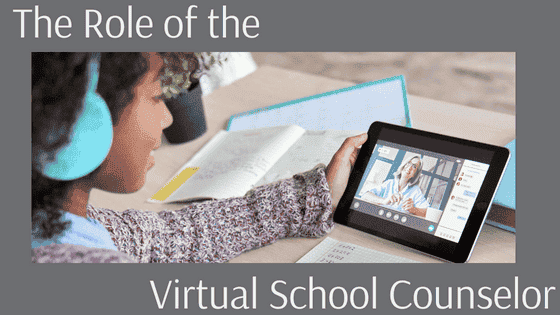We’ve invited Dr. Whitney Wall, psychologist, and instructor, to speak about pursuing higher education options in psychology and counseling. While there are many options to pursue this work, researching and following these options can be daunting. Increased virtual learning programs create even more options and choices.
Voices From Professions
In the years leading up to the pandemic, online learning was on the rise in the United States, as increasing numbers of students ranging from kindergarten to the postsecondary level were enrolling in virtual schools and online distance education programs. Covid-19 escalated this trend, and as it ushered in overnight school closures, the groundwork was laid for more deliberate and permanent changes to the educational landscape. Many states, recognizing the unique opportunities that the remote learning setting provides, began approving virtual academies and charter public schools to serve as state-funded educational environments. Some offer part-time hybrid models (with a mix of face-to-face and remote learning), while others offer fully online programs. As a result, many school counselors began offering virtual services and/or completely transformed their school counseling programs into virtual ones.
Chris McLaughlin, MSW, LCSW, talks about the importance of counseling competencies when working with LGBTQ+ clients. Chris uses his knowledge and experience of the LGBTQ+ community to provide an in-depth look at common areas of concern for this client population, and where clinicians often fall short.
During the interview, Chris talks about the immense value of respecting whatever a client shares, and that bringing parents or guardians into the conversation can be “a delicate balance.” Ordinarily, Chris says that his “rule of thumb is to always follow the lead of the youth,” and that his role is to never out youth to their parents—even if safety issues are present. According to Chris, “regardless of the presenting concern,” he always asks questions about sexual orientation and gender identity with his clients. For some youth, they may have never encountered an adult who expressed interest in these issues; and for others, they may be waiting for a safe enough space to be vulnerable.
In this video interview, Dr. Ebony White talks with Ray Barrett about the American Counseling Association’s Anti-Racism Commission. During the discussion, Dr. White explains how the commission is addressing “the historical racism and continued exclusionary practices that have existed in the [counseling] profession and the [ACA] organization.”
On an individual level, Dr. White says that tasks call on the ACA to play a larger “role in [using] decolonized theories and interventions…specifically with Black clients [and] making sure that anti-Black racism, reform, advocacy, and activism is occurring at all levels”—with an additional emphasis on leadership pipelines for marginalized populations.
Dr. Sheri Pickover, a Central Michigan University (CMU) Counseling Department faculty member, talks with the Telehealth Certification Institute about how she implemented a telemental health training component for her counseling practicum students. Since CMU is in a sparsely populated part of Michigan, access to mental health services has been a long-time concern for residents. Dr. Pickover notes how valuable telemental health training has been to transition students to an online mode of counseling during the COVID-19 pandemic.
Jill Cook, the Executive Director of the American School Counselor Association (ASCA), spoke with Raymond Barrett, the CEO of the Telehealth Certification Institute, about the professional role of school counselors. In addition to being the Executive Director of ASCA, Cook is also a Certified Association Executive (CAE) and a former chair and member of multiple national organizations. Cook assisted in the development of the School Counselor of the Year program and the Recognized ASCA Model Program (RAMP) at ASCA.
According to Cook, there are over 120,000 counselors in K-12 schools who assist students with academic development, social-emotional development, and all types of post-secondary professional and educational goals.
How to Increase Diversity and Equity in Mental Health? Be Curious. Be Brave.
People of color need counseling. And they want it. But there are barriers, including barriers unwittingly put up by counselors.
“Communities of color are not always aware of the benefits of counseling,” said Dr. Kim Lee Hughes, President of the Association for Multicultural Counseling and Development (AMCD). AMCD’s mission includes recognizing diversity in our society and enhancing the development, human rights, and the psychological health of ethnic/racial populations and all people.
Hughes adds that in some communities of color, individuals may not be aware of how to find a counselor or how to use their insurance.
The counseling profession has struggled with barriers to delivering mental health services to clients across state lines since the conception of licensure law. Most states require counselors to be licensed in the state where the client resides. This means clients have to find a new counselor if they move out of state. It also limits telehealth options for many clients.
To address this dilemma the American Counseling Association (ACA) – in collaboration with the National Center for Interstate Compacts (NCIC) – has been working on an interstate licensure compact. This compact would create licensure portability for professional counselors – creating a way for counselors to practice in multiple states.
To explore what the interstate compact would mean for counselors, Raymond Barrett, CEO of the Telehealth Certification Institute (TCI), interviewed Dr. Lynn Linde, chief knowledge and learning officer at ACA.





The course was so informative and I was glued to my screen for the entire duration. I received so much knowledge concerning ethics in telehealth and I am greatly encouraged to read about all the standards and policies that pertain to my practice. Thank you!.